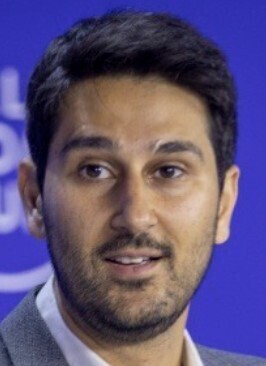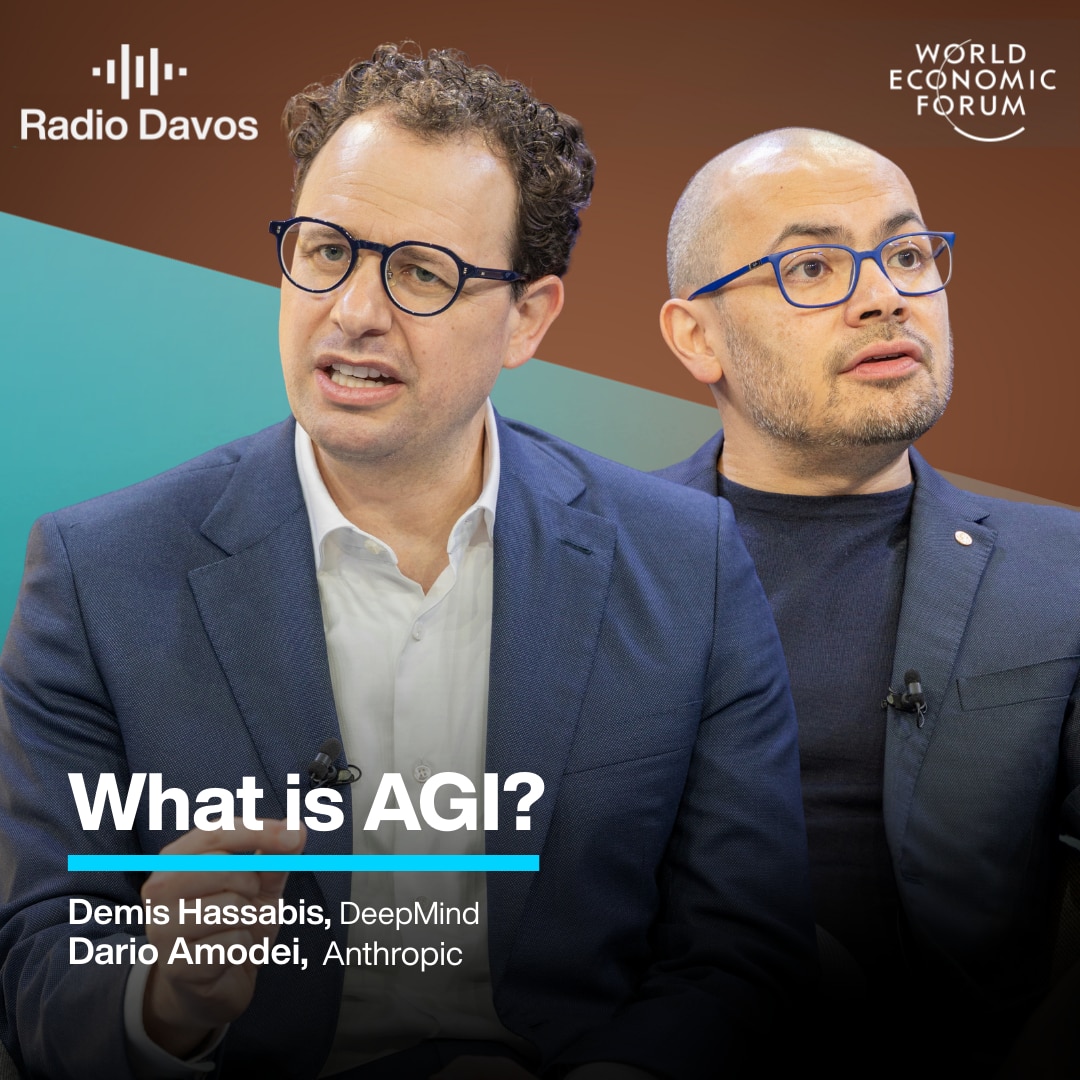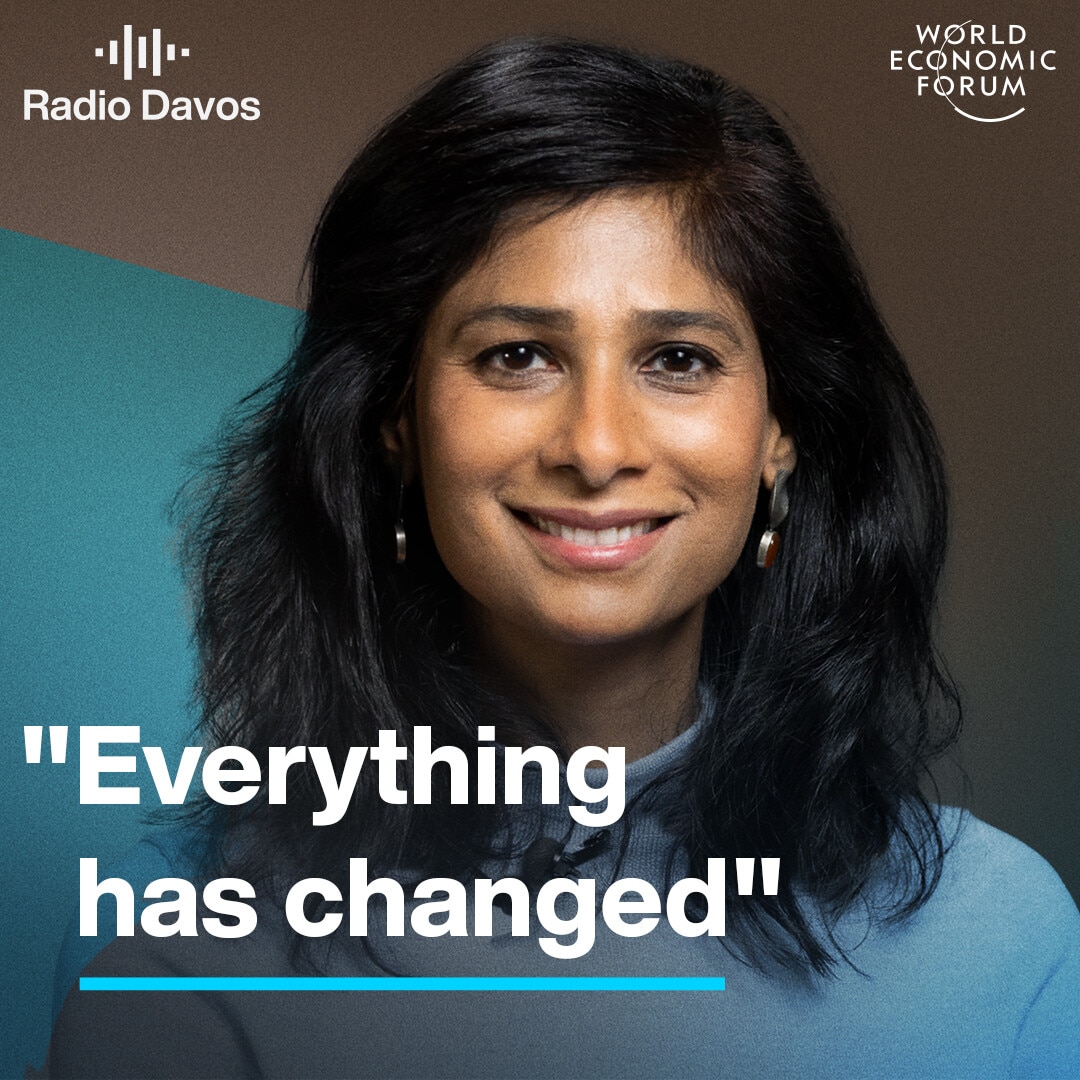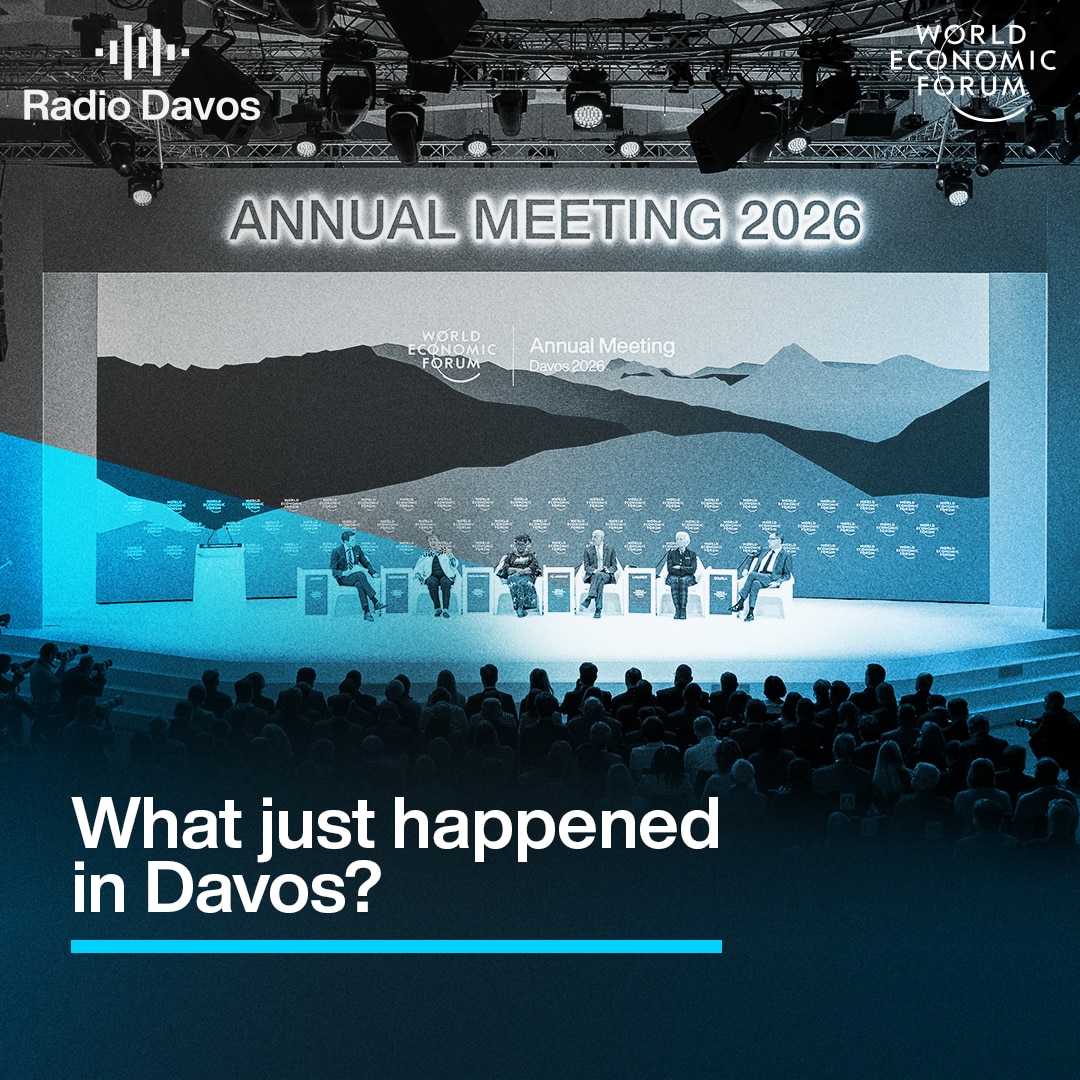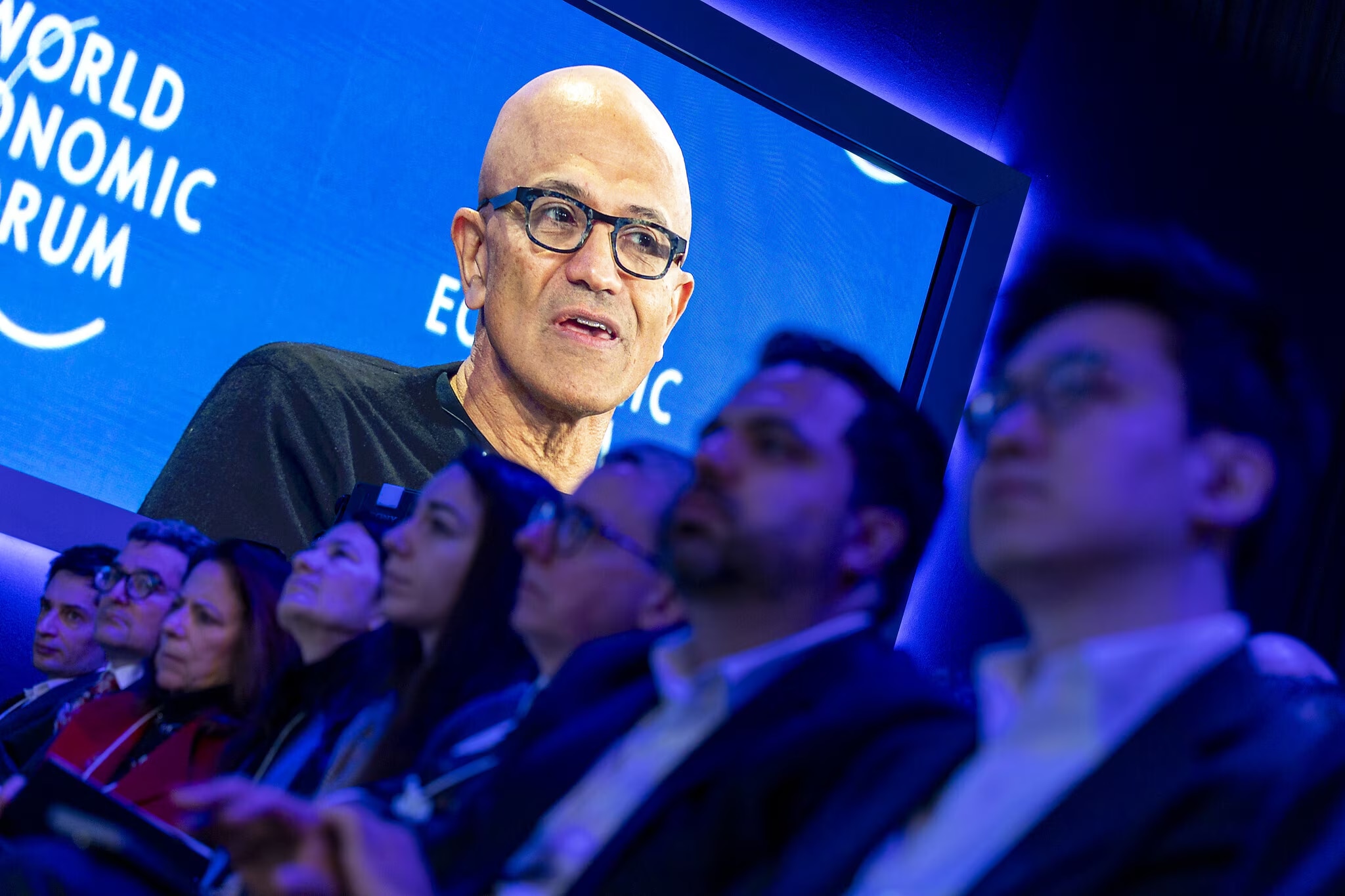Do you need an AI mentor? This tech entrepreneur thinks so
播客文字稿
This transcript has been generated using speech recognition software and may contain errors. Please check its accuracy against the audio.
Robin Pomeroy, host, Radio Davos: Welcome to Radio Davos, the podcast from the World Economic Forum that looks at the biggest challenges and how we might solve them. This week I'm joined by...
Kian Katanforoosh, CEO, Workera: Kian Katanforoosh, founder and CEO of Workera.
The pace at which people need to learn skills is higher than it's ever been in history.
A metric that shows how long a skill might be useful in someone's career decreased drastically from over a decade 40 years ago to now 2.5 years in digital areas.
We should all learn how to talk to machines, whether it's called vibe coding, you're talking to a coding agent, or you're in prompt engineering to other types of agents, we need to learn all of that.
Learn how to learn and make sure that you're AI ready.
Young folks are facing one of the toughest job markets that they've ever that has ever happened in the last decades but you can still stand out by being a lifelong learner, a fast learner, and being AI ready.
Robin Pomeroy: Hi Kian. How are you?
Kian Katanforoosh: I'm great. Thank you Robin.
Robin Pomeroy: What is Workera?
Kian Katanforoosh: Workera is a skills intelligence platform, which means that we built a technology that allows us to measure skills at scale and very granularly. It can help in many ways, such as understanding how ready is a workforce for the AI era.
The enterprise side is configured to understand what skills an enterprise might need in the future, turn them into measurable assessments, and then the rest is the employee going through an adaptive agent-like assessment.
Robin Pomeroy: And skills is what we all need to know about right now because AI is already transforming the way lots of us work, and we worry about what skills we're going to need next and this is what you're addressing then, right?
Kian Katanforoosh: That's right.
If you look today, the pace at which people need to learn skills is higher than it's ever been in history. The World Economic Forum has this data around the half-life of skill. A metric that shows how long a skill might be useful in someone's career decreased drastically from over a decade 40 years ago to now 2.5 years in digital areas.
Robin Pomeroy: So if you have a skill, it'll be useful just for two and a half years, and then you are going to need something else?
Kian Katanforoosh: It's really dependent on the skill you're talking about. So speaking in English might be a skill that has a longer half-life. We think it's gonna be helpful for decades, even more.
But AI skills change super rapidly. You constantly need to refresh your skills. And so it becomes a deep pain point for enterprises who wanna stay up to date to manage to refresh their skills at a pace that will allow them to innovate.
Robin Pomeroy: Do you think enterprises realize that yet, or are they just starting to realize it?
Kian Katanforoosh: I think enterprises underestimate how much behind they are in learning velocity, in the velocity. Especially if you compare to the startup ecosystem where it's all about the speed. Most startups today will tell you that their mode is their team and their ability to learn and adapt to change. And that's what makes it possible for startups to compete with larger companies at the end of the day.
We also run a survey asking 800 leaders and 800 employees if they felt like they were ready for the AI era or their organization was ready. And it was incredible to see how drastic the difference was between leaders feeling, yes, we're probably ready, and actually people doing the groundwork feeling like they're not ready and supported at all.
Robin Pomeroy: What are the skills right now, because you've also been involved in Coursera, creating this deep learning specialization course. How do people really learn some of those skills that are needed now? Where do we even start if someone's not already into it?
Kian Katanforoosh: You're asking for someone who's non-technical or for someone who's technical or both?
Robin Pomeroy: Well, let's start with non-technical, actually. I mean, because the promise is there, for example, you hear this phrase, vibe coding, as well. I know you're associated with Andrew Ng, and I remember an interview he gave to the World Economic Forum, who said you should learn coding anyway. It's just a good skill to have. Just so you understand a bit of what's going on in the background.
I've spoken a lot of people who say, no, if you're not a coding, you shouldn't learn coding. You can vibe code, you can use real language.
What do you think? I'm not a specialist, I'm a computer engineer, I'm on a programmer, but I would like to be able to create an app, for example. Where do I even start though? I can't spend three years doing a course on this. I want to get going pretty soon. Where would I even start?
Kian Katanforoosh: I would say, so generally, yes, we should all learn how to talk to machines, whether it's called vibe coding, you're talking to a coding agent, or you're in prompt engineering to other types of agents, we need to learn all of that.
Some of that learning needs to be more structured. Like you need to have some sort of a formal introduction to what are the different AI systems that exist? How do you work with them? And that probably needs to refreshed on a regular basis. So I would encourage people to do that formal learning.
But outside of the formal learning, the way you keep up with things that change is through your learning mindsets, growth mindsets, learning velocity, is have you forged the right mindset and behaviors that lead you to continually want to learn?
And you might take small steps at the beginning. You might try to incorporate a little bit more usage of an LLM into your daily life. You're planning a dinner for your friends. You're going out and you're trying to figure out what activities you want to do. You're planting a trip. And you make an active effort to include in your daily workflows some of these LLMs.
And over time, you'll realize that it becomes a part of your life. You just don't think about it anymore. You're like, want to decide what to eat tonight and what are the restaurants around you? You will probably talk to a machine to do that and you would not even realize at some point. I think that's the first level of literacy that is needed.
If you go beyond that, then I would give you a different answer where you probably need to have even more of an active effort of being plugged in the right news outlets, the right media, following the right people in order to always be at the edge of what's happening.
And that's more the type of things that an engineer would care about, or a scientist would care, or an analyst would care. Someone who wants to use AI in their professional career needs to be plugged in the Silicon Valley ecosystem today, in my opinion.
Robin Pomeroy: Okay, what's one channel you would follow? Maybe I'm not following anyone.
Kian Katanforoosh: Well, I would say Andrew Ng has a great newsletter that comes out every Wednesday called The Batch. I would definitely follow that. On top of that, I actually tell my students at Stanford look at who I'm following on Twitter and just follow the same people. And then five minutes a day, read X or Twitter and look at what's happening. And yes, there's a lot of fluff, but over time you're going to sharpen your eye to understand what's fluff and what's not fluff.
Robin Pomeroy: Can I get an AI agent, and I want to talk about AI agents, maybe I don't want to be on X and look at all that and filter out the fluff, can I say to an AI bot, you go on X for me, find me the five most interesting things today, is that possible yet?
Kian Katanforoosh: Yeah, absolutely. It's probably possible today already, maybe not mainstream, but it will be very soon.
Just to give you an example of a similar problem that Workera solves. Historically, enterprises have been teaching their workforces with one-size-fits-all classes. You take a class and you send it to thousands, tens of thousands of people, and you realize that very few complete it, because it's not to the right level. It's not relevant to their job.
And instead, today, what we do is you just put an agent on top of all the latest courses that exist out there and you let the agent figure out what the person should learn based on an assessment of their skills.
So you don't need to think where am I going to spend my time because the agent is going to tell you, based on what I learned about your strengths and your gaps and the goals that you have on your next projects. These are the three, five videos that you need to watch. It's going to take you 15 minutes and you're probably going to be good for this week. In the next week we're probably going look at another batch of learning based on your progress.
Robin Pomeroy: Is that already available on the apps commonly available that people are using? Or is that something more specialized, I want to talk to you about your own AI agent, Sage. But also, could you just ask ChatGPT or DeepSeek or something? Because they do remember who you are and where you're at on a learning journey or you're producing something. Would that even be sufficient for some of it?
Kian Katanforoosh: I'd say on the consumer side, if you're sort of a power user of ChatGPT, try to get that level of information. Try to use the search tool, the web search to, you know, browser use in order for ChatGPTs or other LLMs to be able to help you with acquiring the right knowledge, for sure.
When it comes to the enterprise, there is another series of data points that are important. What is your project? What is the OKRs of the company? What are the goals of the business? All of that should direct your learning.
So when you're a worker, the way you approach learning is actually different than when you are a consumer trying to find a job.
And those differences make it that Workera was built for the enterprise specifically and integrates with that ecosystem to be able to tell you because of the project that you have or because of next job that is ahead of you in the job family, this is the type of thing I would recommend for you.
Robin Pomeroy: So tell us, what is an AI mentor, and that's what you're doing with Sage, if I understand right? What is an AI mentor?
Kian Katanforoosh: An AI mentor is a system that would help you grow your career faster than you could before.
And an AI mentor has a few capabilities. I usually talk about three capabilities. The first one is it has to be extremely good at assessing skills you know and humans are not that good at accessing skills they're not good at assessing their own skills they are not good assessing other people's skills so that's somewhere AI can be helpful fair unbiased assume that a mentor needs to understand your skills in order to help you.
The second aspect is a mentor needs to understand goals. And a good mentor, if you remember, in your own life might have helped you dream bigger, dream higher. And that's a core capability of a mentor. Understand what is an ambitious, yet achievable goal that is good for the individual. So now you have a mentor that can assess where you are today and that can set great goals for you.
The rest is all about the third system, is connecting the dots. It turns out that humans are not great at connecting the dots. That's something that a senior, let's say, partner or a senior executive would be better at because of the wealth and years of experience that they've accumulated. But there is no way that a human would know what are the best courses out there right now, the best tools to use. We just can't keep up with progress, but AI can. And so actually connecting the dots is something that AI is really good at.
In a company, an AI can find a project that just came up that might be a good fit for you. It might find a new role that opens internally and that might a good for you and you actually as a company don't need to hire externally because you have an employee that is really fit for that role.
These things are things that humans can't keep up with and so you would rather let AI figure it out.
Robin Pomeroy: I'm going to play devil's advocate with you now. The AI, as we know, is used a lot in recruitment to filter out CVs. And a lot of job seekers, I'm speaking from the other, the retail end of it, don't put much trust in it because it's filtering out, maybe I've been filtered out from jobs where I'm totally suitable, but I forgot to put the right keyword in.
I'm probably talking about machines from 10 years ago here. I'm hoping you're going to say, that's not the case anymore. Your system's smart enough to not have to just hunt for whether I've mentioned the word 'coding'. Although probably if there's a job about coding it's going to be in there. But you know what I mean? It seems to have been a bit blunt and a bit clumsy. From just from my limited experience of this up to now, in judging people's real skills.
And also when you apply for a job in a CV or an interview, sometimes it's not truthful. You know, how do you really assess someone's genuine skills? And would you say what you've created is less clumsy than that, can really understand what a person's true skills and true potential are?
Kian Katanforoosh: Yes, that's a great question. And I would take a step back and look at how have we designed our recruiting funnel so far? We've designed it as a filter. The reason we designed it has a filter is because it takes a freaking ton of time to interview people. And so you want, as you said, to sort of look at the resumes and filter out 90% of your candidates based on that, and then go and focus on the 10% and maybe spend slightly more time on those, and then narrow it down to 2%, and then focus a lot of time on those 2% until the single person gets the offer.
In an age where AI can help automate part of that process, the funnel doesn't make sense anymore. Why wouldn't you interview everyone if you have the bandwidth because AI is 24-7 ready to interview.
So the problem completely shifts. And in that world, the resume screening doesn't any sense at all. Resume is a bad asset for skills measurement in the first place.
So I'm questioning whether the problem is the AI that's reading the resume, or the problem is as much the person being able to write whatever they want in their resume without anybody verifying it and some people just not writing the right keywords by mistake or by lack of luck.
And so I would completely redesign that funnel to not be a filter anymore but be a place where you actually run AI at different stages, in different ways, in order to give enough time to uncover people's truly unique skills.
Now, when it comes to the question of AI interviewing. I've interviewed many people. I've also interviewed as a candidate in many jobs, and I know that interviewing is hard as a human. Even today after, you know, we have close to a hundred people at Workera. I've interviewed everyone and I still struggle with interviewing. I know I'm not good at it. I know I would rather AI do it because I know that humans have inherent biases.
There are certain things that I pick up on that maybe another great interviewer would actually not pick up. And I shouldn't pick up that. Humans also tend to hire people that sound like them, that look like them and I think that's an issue because truly if you're going to build a more meritocratic society you want to focus on who's the most skilled and who's the most deserving for that specific role.
And I truly think that you know a year from now, as soon as a year from now you're going to start seeing the first validation studies showing that AI is a better interviewer than human.
And once you have those validation studies you wouldn't even want to get too much into details because you would start trusting that AI's a better interviewer than humans and you would actually not want humans to interview people.
Robin Pomeroy: I suppose that implies that the AI, you've got rid of all the bias in the AI and where's that human element come in? Because you might think, oh I'm a very charming, charismatic person, I can get this job by my sense of humor or just how delightful or the suit I'm wearing today. And the AI will discount that. Some people might be socially awkward, but actually brilliant at a job. That's the person you want, but they don't come across well in an interview.
You think those are the kinds of things the AI will be able to get past that in their human can't?
Kian Katanforoosh: I think it's not going to be AI beats human interviewing at every skill up front. Not like a situation where it's AGI is, on Monday you wake up and AGI's here. It's not going to be like that.
We're going to look at the variety of skills, mindsets, behaviors, that's. We could measure automatically, and we're going to start validating where is AI better than humans. So for example, if you're assessing someone's technical skills today, I think AI is likely better than most humans at picking up on that.
If you're accessing humour, maybe today AI is not quite there yet. And so you're going have to figure out where am I comfortable using AI for skills measurements, and where am I going to delegate to humans.
And actually, I think that's very healthy, because it allows a good human interviewer to spend more time on the things that humans inherently pick up on that AI can't pick up on.
Robin Pomeroy: What do you use AI for? How do you you use AI?
Kian Katanforoosh: I use AI hours a day in a variety of ways. Some of my favorite uses is some self-awareness prompt, like based on what I told you so far, what do you think of me? What do you thing I should do more of or I should less of? A lot of self-reflections I use it for.
I also do it for practice. I would say before I go to a board meeting in Palo Alto, I usually drive for an hour from San Francisco and I put the voice mode on and I practice for the board meeting before I arrive to make sure I'm really ready.
Robin Pomeroy: And it critiques you?
Kian Katanforoosh: It critiques me. It depends on the prompt that I might use, but yeah, usually I would ask it to be very genuine and direct with me.
Robin Pomeroy: Some people have it on all the time, right, there's these things where it's listening to you all the time, and is that something you use? Or you just, when you get in the car, you switch that on? I've heard of these devices that you wear and they're listening to you all this time and kind of correcting you.
Kian Katanforoosh: No, I haven't used a device that would hear me all the time, but I turn it on very often.
Robin Pomeroy: And what's surprised you most from the advice it's given you?
Kian Katanforoosh: I think what has surprised me most is that it understands me quite deeply from a softer standpoint. Like maybe it cannot grasp my proficiencies. For sure it cannot grasp my proficiency in my technical areas. But from a from a soft standpoint, I think my values, it understands them quite well.
Robin Pomeroy: Does it also understand the different audiences you'll be speaking to because it might be that if you're doing a boardroom presentation you need to be this version of you but if you are just going for a more casual chat, it's a slightly different version of yourself. Do you think your AI agent gets that?
Kian Katanforoosh: I think it's a very good question and humans are multidimensional. It's true that when you show up at work, you might show up differently than when you go back home and you show up in front of your family or your friends.
The interesting thing is that AI can see all of them, all of those facets of you and probably understands you more holistically as a human versus maybe if you have an AI that only follows you at work. It will see the work version of you.
But if you have that consumer agent that's following you across your life cycle, it probably understands all the dimensions.
Robin Pomeroy: Should I be worried about the big brother aspect of this though. I am telling an AI, therefore I'm telling a tech company, everything about myself, you know, in real time. We've learned, I think since social media, since the internet, to be a little bit protective of our data.
Does it ever worry you? Should people be worried about, yeah, sure, I'm going to tell this AI company everything about me, and it's going to help me. But isn't there a downside of that? Am I right to be a little bit paranoid?
Kian Katanforoosh: Yeah, I wouldn't, I'm not paranoid personally and I would, I am an optimist, I truly believe that mankind would figure it out in a way that's safe and private for people.
Just like internet browsing, we are used to it right now. However, I would say people need to learn about privacy and they need to learn what can I upload on these systems? What should I not talk about to these systems? If you don't know, you're going to expose yourself to a ton of risks and those risks are going to be exacerbated in the coming years.
So I would take a dual approach. Yes, I believe that we're going to figure it out as a community, but two, I will urge all my friends and family and coworkers to be really careful about privacy, and to know what they can do.
Robin Pomeroy: Yeah, I mean, if I even look back on what I posted on social media 10 years ago, I wouldn't post it now. And so I guess it does evolve. This might be, as you say, now and in a year's time, we will learn our behaviour, how we interact with AI might moderate as we get more used to it and really understand how that data could be used.
Kian Katanforoosh: Yeah. Absolutely. And I would even say today, you're going to start seeing some of these AI features come to your agent applications.
For example, you can go to your settings and look at the memories and what memories it has about you. And you can delete them if you'd like. And I would encourage people to do it if they need to.
There's going to be more of these features in the future. I think you will see people more in control of their data and people more aware of what they can do for data.
It's also generational, right? If you look at the new generations, they're well aware of digital tools, the risks associated with it, and how to control it than like, the older generations together today. So I think it's going to shift.
Robin Pomeroy: If you had a word of advice for young people, maybe still at school, looking at this really rapidly changing world, what would it be?
Kian Katanforoosh: I would say learn how to learn and make sure that you're AI ready.
Young folks are facing one of the toughest job markets that they've ever that has ever happened in the last decades but you can still stand out by being a lifelong learner, a fast learner and being AI ready and bringing a fresh perspective to the companies that you are going to join or build incredible companies for the new generation.
Robin Pomeroy: And is there a book you would recommend to anyone, to everyone? Or, and it doesn't have to be about AI or technology. Or, if there's not a book, is there podcast, or a movie, or something that you think everyone should get to know?
Kian Katanforoosh: I am a sci-fi fan and I used to advise people to read a lot of sci-fi because I felt about a decade ago that it would help you shape your mind around what's going to happen because there are some truths to it, not everything might be true.
But today I think it's a more accepted truth that sci-fi would give you a better outlook of what might happen or might not happen in the future.
And so I have this trilogy called The Three-Body Problem that I absolutely love and I recommend to everyone to read. It's tough to get in, but once you're in, you will love it and you will learn a new perspective from an author, Xiqin Liu, who has a very interesting perspective of where the world might evolve from a technology standpoint.
And knowing sci-fi can help you dream about the future, can help anticipate what might happen, and I think it's one of the best skills today is to predict the future.
If someone can really predict the technology well, they're ahead of everyone and they can do great.
Robin Pomeroy: Do you think that sci-fi has properly predicted the future in the past, people often cite Asimov...
Kian Katanforoosh: Absolutely. I think you look at what Asimov wrote with Foundation. A lot of bits and pieces that he mentioned, even around AI, are now coming to reality. And if Asimoff was able to do it 50 or more years ago, I'm sure the new sci-fi authors today are looking at what might happen in 50 to 100 years from now, and some of them will be right.
Robin Pomeroy: Do you have any examples of when an AI agent has changed someone's life?
Kian Katanforoosh: Well I will tell you that, you know, starting with myself, I have a skin condition that is kind of annoying, it prevents me from sleeping sometimes, and it was very tough five years ago, it was a significant portion of my body.
And I was always looking on Reddit and other platforms to find other people that have experienced the same thing and what have they done with it.
And when I tried it on Child GPT, it truly changed me because it could give me a set of things to do that might improve me. And if you look right now, I don't have anything anymore on my body.
So I don't know if it's just luck and serendipity and something happened, or if it is actually me following very granularly all the techniques that AI had given me to live a healthier lifestyle, but I can say that it changed my life from that perspective. I sleep better, I feel more productive, and that small change that no doctor could give me, ChatGPT gave me.
Robin Pomeroy: I've heard a few people say similar things, we should caveat of course, AI can get it wrong.
Kian Katanforoosh: For sure, for sure. And it probably gets it wrong often, but for me, at least my experience was it gave me different things to try that ultimately led me to be healthier.
Robin Pomeroy: Wonderful. Well, we're going to have to wind it up, but maybe we can speak again sometime soon, I don't know. Kian, thanks for joining us on Radio Davos.
Scroll down for full podcast transcript - click the ‘Show more’ arrow
How can you keep up with the rapidly changing skills needed in a job market being transformed by artificial intelligence?
Kian Katanforoosh, founder of tech startup Workera, has advice for all of us on how to ensure we are 'AI-ready'.
Related podcasts:
话题:
新兴技术分享:
更多集:
每周 议程
每周为您呈现推动全球议程的紧要问题(英文)
